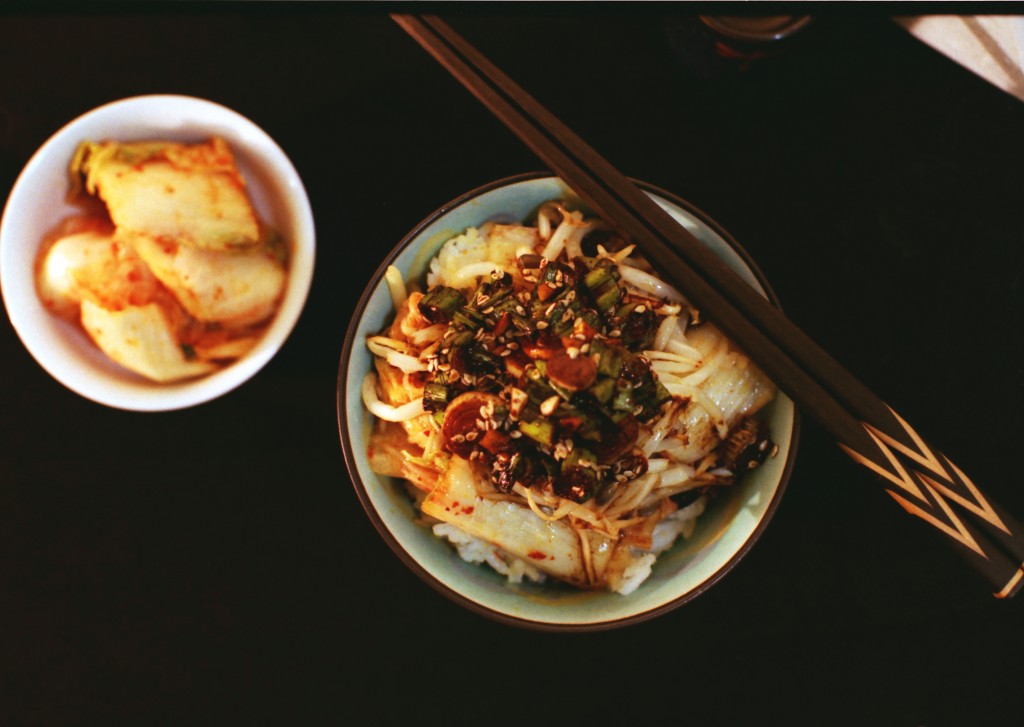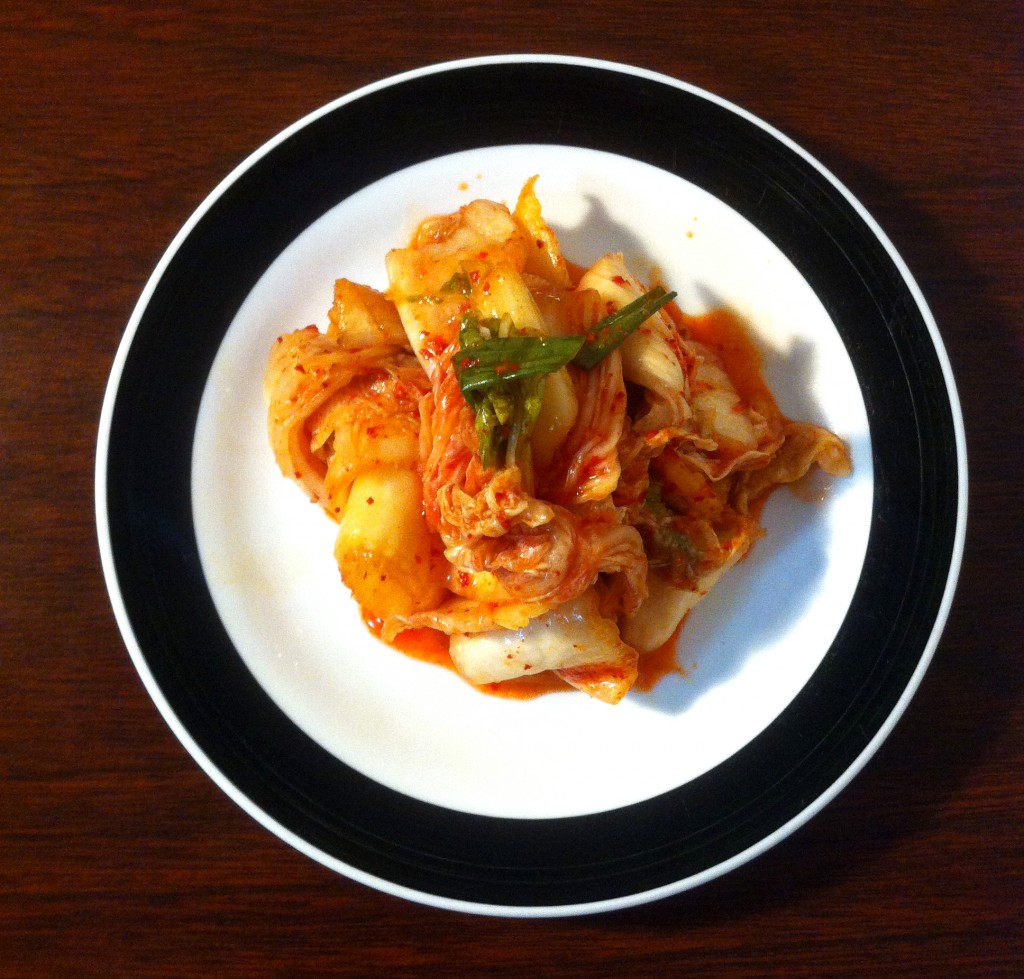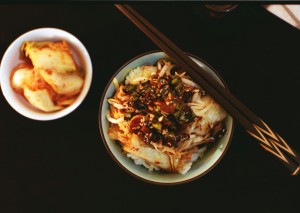 Kongnamul Bap (Korean Mixed Rice Bowl with Bean Sprouts) and Kimchi
Kongnamul Bap (Korean Mixed Rice Bowl with Bean Sprouts) and Kimchi
I love Korean food! The spicy fermented vegetables, the seared meats served straight off the grill, the infinite variety of banchans (side dishes that accompany the main course), and the bibimbap (mixed rice bowls). These flavors awaken the taste buds and leave you wanting more.
Kongnamul bap is a type of bibimbap that features soy bean sprouts. Kongnamul bap is easily prepared, healthy, and inexpensive. Bean sprouts, kimchi*, and cooked rice are placed in a pot with a small amount of water and oil. The pot is then covered and heated, effectively steaming the vegetables and rice. The kongnamul bap is then ready to serve, topped with spicy soy sauce . . . it’s really that simple! This is a perfect meal for a busy weeknight.
Featured Ingredient: Kimchi
Baechu Kimchi (Napa Cabbage Kimchi)
It’s hard to talk about Korean food without mentioning kimchi—their national dish. Kimchi features spicy fermented vegetables, usually napa cabbage. It’s served with every meal in Korea, including breakfast!
Recipes vary greatly, but typical ingredients include napa cabbage, salt, garlic, red pepper powder, green onions, ginger, sugar, salted shrimp, and fish sauce. Some might be wary of pairing fish sauce and salted shrimp with cabbage, but it doesn’t taste fishy; rather, it’s spicy, tangy, and delicious. Vegetarians can find kimchi without the seafood ingredients.
You can find kimchi at some grocery stores, most Asian markets. It’s packaged in glass jars or plastic tubs in the refrigerated section. If you’re a Chicagoan, the Super H Mart in Niles has a great selection of kimchi (aisles and aisles of it, in fact), marinated Korean bbq sliced and ready to go, several different banchans, and pretty much every other Asian ingredient you could possibly want (up to and including live eels and flounders). It’s one of the largest Asian grocery stores in the US. You can also buy it on Amazon if you can’t find it locally.
Warning: kimchi may be addictive. I have a gallon tub of it in my fridge, and I often have a bowl with breakfast and/or lunch. Its fiery freshness is irresistible. If you haven’t tried it yet, you really should.
I hope you enjoy this kongnamul bap as much as I do!
If you enjoyed reading this post, like my Facebook page and subscribe to my blog to follow my cooking adventures and flavorful journeys!
Korean Mixed Rice Bowl with Bean Sprouts (Kongnamul Bap)
| Serves | 2 |
| Region | Asian |
| Website | slightly adapted from c How Divine |
Ingredients
Kongnamul Bap
- 2-3 Cups soy bean sprouts
- 1/2 - 1 cup ripe kimchi
- 3 Cups day-old rice (cold)
- 1-2 Teaspoons canola or vegetable oil
- 2 Tablespoons water
spicy soy sauce
- 1-2 scallions (thinly sliced)
- 1 garlic clove (minced)
- 3 Tablespoons dark tamari (or other soy sauce)
- 1 teaspoon honey
- 1 teaspoon sesame oil
- 1-2 Teaspoons sesame seeds
- 1 teaspoon gochugaru (Korean red chili pepper powder)
Directions
| Kongnamul bap | |
| Step 1 | |
| In a heavy bottomed pot with a tight fitting lid, add water, soybean sprouts, kimchi, and oil (in that order). On top of the kimchi, add the cold rice. Close the pot. Make sure the lid is on tightly. Turn the heat on to medium. Cook for 3-4 minutes, then adjust the heat to LOW. Continue cooking for another 14-15 minutes. As tempting as it may be, don't open the lid during this process. | |
| Spicy soy sauce | |
| Step 2 | |
| While the Kongnamul bap is cooking, prepare the sauce. In a small bowl, stir together all of the ingredients for the sauce. | |
| Step 3 | |
| Once the kongnamul bap is done cooking, remove the pot from the heat. Leave the lid closed for 1 more minute. | |
| Step 4 | |
| Divide the contents between 2 bowls. Place the rice in the bottom and top with soybean sprouts, then kimchi. Add the spicy soy sauce on top. This gives you the best presentation of the dish. Alternatively, you can mix the kongnamul bap in the pot and divide the mixed rice into the two bowls, then top with the spicy soy sauce. Serve immediately while still hot. Mix and enjoy! | |



 Print recipe
Print recipe

Pingback: 2013 Flavorful Journeys - My Favorites | Flavorful Journeys World Cuisine
Pingback: Korean-Style Tuna Tartare + Why I Love Food
Pingback: Canal House Lentils, Teriyaki Shiitake Mushrooms, and Kale